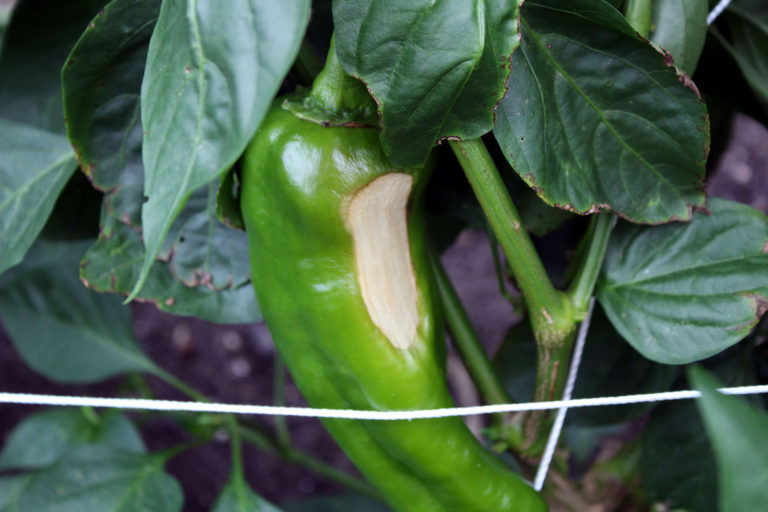Sunscald
Disease Identification
Description
Sunscald is a cultural disorder that affects the fruit of plant that have been exposed to direct sunlight for a length of time. It is not directly related to any plant disease or insect.
- Leaves: Not affected
- Stems: Not affected
- Fruit: Affected fruit show a bleaching or blistering of exposed skin. Bleached skin (most common) usually turns white or a lighter color as well as thins to a papery texture. Blistering skin usually turns black with bumps on the surface of the fruit. If the fruit remains on the plant, rotting of the affected surface may occur
Images
Affected Plants
Disease Control
Life Cycle
Sunscald is not a disease but a disorder equivalent to a sunburn where the fruit is exposed to direct sunlight for long periods. While it will not spread to other plants, it is likely nearby plants will also experience sunscald due to similar cultural practices.
When you notice sunscald on a fruit, you can either remove the fruit from the plant or allow it to grow while closely monitoring its growth. As long as the fruit is still firm and isn’t showing signs of disease, it will not be harmful to let it grow. Before eating, remove the damaged portion and check the remaining fruit for signs of disease. If everything is healthy, enjoy your produce.
Management
- Install Plant Supports: As plants grow, they can easily overtake supports that were installed at the beginning of the season. This causes the plant to fall which exposes fruit to sunlight. Maintaining proper supports for your plant will prevent this rapid change in lighting on the fruit.
- Do Not Overfertilize: Excessive fertilizer applications can cause the plant to grow tall with inadequate foliage. Limit fertilizer applications and if you need to apply fertilizer, only apply slow-release organic varieties in order to limit rapid nutrient uptake.
- Plant Stress: Stressed plants often drop large quantities of leaves which result in the fruit being exposed to the sun. If you are having difficulty diagnosing issues with your plant, contact us or talk to a neighbor for assistance.
- Resistant Varieties: Some varieties of plants grow more dense foliage which helps block the suns rays. Look for plants which indicate this on the plant tag or seed packet.
Sunscald cannot be slowed or stopped by any topical fruit sprays. Do not spray anything on your plant to stop or prevent sunscald.

